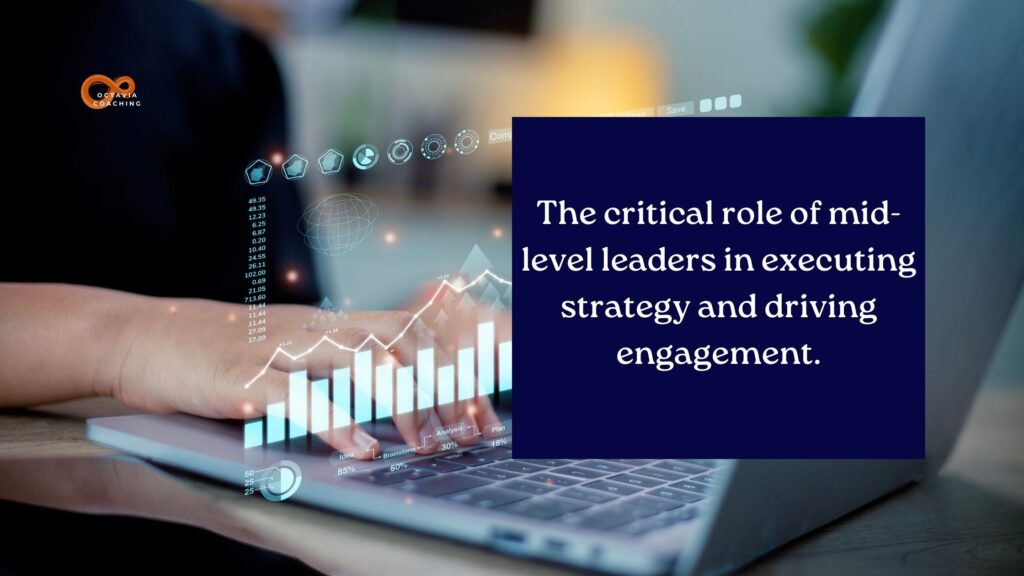Introduction
Middle management plays a pivotal role in executing corporate strategy, driving employee engagement, and fostering organisational success. Despite this, many businesses overlook the importance of mid-level leaders, focusing instead on top executives or frontline staff. This white paper explores why middle managers are the linchpin of a successful organisation, addressing common challenges they face and offering strategic solutions to enhance their effectiveness.
Problem Statement
Organisations often struggle with bridging the gap between strategic vision and operational execution. Senior leadership formulates high-level strategies, while frontline employees carry out tasks, but without effective middle management, these strategies may falter. Middle managers frequently face role ambiguity, inadequate training, and limited autonomy, hindering their ability to drive performance and engagement. Without strong mid-level leadership, businesses risk poor communication, decreased productivity, and disengaged employees (Harvard Business Review, 2021).
Background Information
The role of middle management has evolved significantly in response to changing market dynamics, technological advancements, and shifts in workplace culture. According to industry research, companies with strong mid-level leadership report higher employee engagement, lower turnover rates, and increased innovation (McKinsey & Company, 2022). However, many organisations fail to equip middle managers with the necessary resources and support to succeed.
Key Industry Trends:
- The rise of remote and hybrid work models necessitates greater adaptability and communication skills among middle managers (Gallup, 2023).
- Increasing expectations for employee well-being and professional development place additional responsibility on mid-level leaders (McKinsey & Company, 2022).
- A growing emphasis on agility and digital transformation requires middle managers to be proactive problem-solvers and change agents (Harvard Business Review, 2021).
Proposed Solution
To maximise organisational success, businesses must invest in developing and empowering middle management. This involves:
- Comprehensive Leadership Training: Providing middle managers with targeted development programmes focusing on communication, strategic thinking, and people management (McKinsey & Company, 2022).
- Enhanced Decision-Making Authority: Allowing mid-level leaders greater autonomy in decision-making to drive agility and responsiveness (Harvard Business Review, 2021).
- Clear Role Definition: Establishing structured frameworks that outline responsibilities and performance expectations (Gallup, 2023).
- Improved Communication Channels: Ensuring middle managers serve as effective conduits between senior leadership and frontline employees (Harvard Business Review, 2021).
- Recognition and Incentives: Motivating mid-level leaders through performance-based rewards and career advancement opportunities (McKinsey & Company, 2022).
Supporting Data and Evidence
Numerous studies highlight the impact of effective middle management on organisational performance:
- Research from Gallup (2023) indicates that 70% of the variance in employee engagement is directly tied to the effectiveness of managers.
- A study by McKinsey & Company (2022) found that companies investing in leadership development see a 2.3x return in employee productivity and retention.
- Case studies from private equity-backed firms demonstrate that strengthening middle management leads to enhanced operational efficiency and profitability (Harvard Business Review, 2021).
Conclusion
Middle managers are essential drivers of organisational success, serving as the critical link between strategic vision and execution. By equipping mid-level leaders with the right tools, training, and support, businesses can achieve greater agility, stronger employee engagement, and improved overall performance. Investing in middle management is not just an operational necessity but a strategic advantage.
Finally…
To learn more about how to enhance the effectiveness of your middle management team, contact us for a consultation or visit our website for insights on leadership development strategies. Strengthen your organisational foundation by empowering the leaders who drive day-to-day success.
Reference List
Gallup. (2023). State of the Global Workplace Report. Retrieved from https://www.gallup.com/workplace
McKinsey & Company. (2022). The Business Case for Leadership Development. Retrieved from https://www.mckinsey.com/business-functions/organization
Harvard Business Review. (2021). The Importance of Middle Managers in Organisational Performance. Retrieved from https://hbr.org

